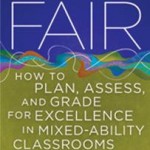Redefining Fair
How to plan, assess, and grade in mixed-ability classrooms
by Damian Cooper
Solution Tree Press, 2011
Damian Cooper is an independent education consultant from Ontario, who specializes in helping schools and school districts improve their instructional and assessment skills. In his latest book, Redefining Fair, Cooper has drilled down and examined each aspect of planning, assessing, and teaching to the diverse needs in today’s classrooms. He explores answers to the questions we struggle with daily such as:
How can I differentiate my program for struggling learners when they are all expected to know the same material?
How should I modify my rubrics for my struggling learners?
How is it fair to those students who are successful the first time if others get to do the assignments and tests over again?
How can my report card grades be fair and accurate when I have such a wide range of students in my class?
Cooper suggests that “Differentiated instruction [or responsive teaching] is much more complex than simply offering students choices with respect to how they will learn and how they will demonstrate their learning.”p19 He suggests that teachers’ success depends on their knowledge of the curriculum and the key essential learning outcomes for all students. Teachers need to plan with the end in mind using the backward design model. This is “not only a good idea; it is, I suggest, the only way teachers today can cope with curriculum overload.” p34
In Redefining Fair, Cooper gives real classroom examples across the grades to illustrate his points. He argues that we can’t plan to teach before we know what the students already know and can do, therefore, formative assessment is essential to inform instruction and optimizes learning for all. He argues that it is time that as educators we “challenge the mythology of measurement by reframing assessment’s primary purpose: that is to improve learning.”p88 In order to accomplish this we need to understand that there are different kinds of assessments that have different purposes and require different responses.
This new resource is very timely and practical. As a publication of Solution Tree, they provide on-line reproducibles and other material associated with this text.
Visit go.solutiontree.com/instruction to download.

Comments are closed.